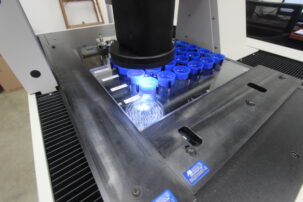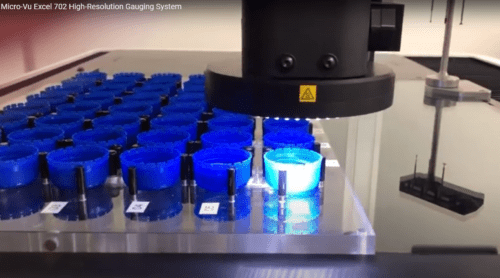Our quality system utilizes the latest technology in the hands of highly-trained professionals to provide an unmatched level of reliability and customer satisfaction.
AdvanTech Plastics utilizes the following QA tools:
1. PPAP (Production Part Approval Process)
The Production Part Approval Process, commonly referred to as PPAP, is a widely recognized quality control tool in the automotive and aerospace industries. It is crucial for ensuring that components and systems meet customer requirements and conform to industry standards. PPAP involves a series of steps, including submission of documentation and samples to demonstrate that a product can be manufactured consistently and meets the customer’s requirements. Key elements of PPAP include:
Submission of Documentation: Suppliers are required to provide detailed documentation that includes design records, process flow diagrams, and control plans.
Sample Submission: Actual parts or samples from the production run are provided to verify that they meet the specifications.
Validation: The supplier must prove the capability of their production process, often using tools like Process Capability (CPk) and Process Performance (PPk) indices.
Warranting Compliance: A warrant is issued to signify that the product meets the customer’s specifications and is approved for mass production.
PPAP is instrumental in reducing the risk of defects and ensuring the quality of components in industries where safety and precision are paramount.
2. Control Plans
Control plans are essential documents that outline the methods, procedures, and standards for maintaining consistent quality in the manufacturing process. They are part of the Advanced Product Quality Planning (APQP) process and are often used in conjunction with PPAP. Key elements of control plans include:
Process Steps: Detailing each step in the manufacturing process, from raw materials to final product assembly.
Tolerances and Specifications: Outlining acceptable ranges for critical dimensions and characteristics.
Measurement and Inspection: Defining how, when, and where inspections will take place and which equipment will be used.
Frequency of Checks: Specifying how often inspections and tests are conducted.
Response Plans: Describing the actions to be taken in case of non-conformance, including corrective and preventive actions.
Control plans help maintain consistent quality by providing a structured approach to process management and identifying potential issues early in the production cycle.
3. SQA (Supplier Quality Assurance) / SPC (Statistical Process Control)
Supplier Quality Assurance (SQA) is a proactive approach that involves a set of practices and tools to ensure the quality of components and materials provided by suppliers. Statistical Process Control (SPC) is one of the key tools used within SQA. SPC involves the collection and analysis of data from the production process to monitor, control, and improve its quality. Key components of SQA and SPC include:
Data Collection: Continuously gathering data from various points in the manufacturing process.
Statistical Analysis: Using statistical tools and charts to identify variations and trends that may lead to defects.
Process Monitoring: Implementing control charts and alarms to alert operators to deviations from established process controls.
Process Improvement: Using the data collected to identify areas for process improvement and implement corrective and preventive actions.
SQA and SPC are critical for ensuring that components from suppliers meet quality standards, as well as for identifying opportunities for process improvement within the manufacturing facility.
4. AIB (American Institute of Bakers) Certification
While the previous tools and concepts are primarily associated with the automotive and general manufacturing industries, AIB Certification is specific to the food industry. The American Institute of Bakers (AIB) provides certification programs and auditing services to ensure food safety and quality in food manufacturing and distribution. Key elements of AIB Certification include:
Food Safety: Ensuring that the facility, processes, and products meet the highest food safety standards.
Quality Assurance: Implementing strict quality control measures to maintain the quality and consistency of food products.
Auditing: Regular audits conducted by AIB-certified auditors to assess compliance with food safety and quality standards.
Training: Providing employees with training and resources to maintain high levels of food safety and quality.
AIB Certification is vital for food manufacturers to meet regulatory requirements and assure consumers of safe and high-quality food products.
These quality control tools and concepts, including PPAP, Control Plans, SQA/SPC, and AIB Certification, play crucial roles in ensuring quality, consistency, and safety in various manufacturing industries. Whether it’s automotive components, general manufacturing, or food production, the proper application of these tools is instrumental in reducing defects, improving processes, and ultimately satisfying customers and end-users.


